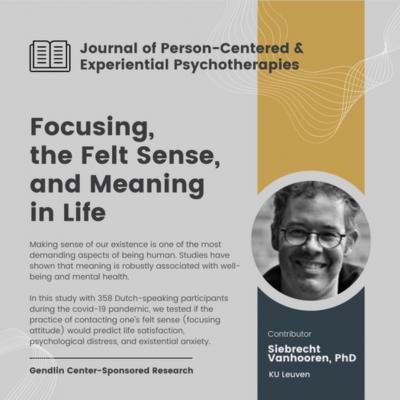Gendlin Center-Sponsored Research Now Published
In The Person-Centered & Experiential Psychotherapies Journal
by Dr. Siebrecht Vanhooren
Abstract:
Focusing, the felt sense, and meaning in life
Making sense of our existence is one of the most demanding aspects of being human. Studies have shown that meaning is robustly associated with well-being and mental health. In this study with 358 Dutch-speaking participants during the covid-19 pandemic, we tested if the practice of contacting one’s felt sense (focusing attitude) would predict life satisfaction, psychological distress, and existential anxiety. We also tested whether the effect of this focusing attitude would be partially mediated by the experience of meaning in life. Our hypotheses were confirmed. This suggests that the focusing attitude predicts more life satisfaction, less psychological distress, and less existential anxiety. The associations are also partially mediated by the experience of meaning in life. Focusing training variables suggested that attending one’s felt sense can be learned. However, our study also suggests that focusing-partnership deserves closer study.
Focusing, le sens ressenti, et le sens de la vie
Le fait de donner sens à notre propre existence est l’une des caractéristiques les plus exigeantes qui soit pour l’être humain. Des études ont montré que le sens est fortement associé au bien-être et à la santé mentale. Dans cette étude conduite auprès de 358 participants néerlandophones pendant la pandémie de la Covid-19, nous avons testé si la pratique consistant à contacter son propre sens ressenti (attitude de focusing) prédirait la satisfaction de vivre, la détresse psychologique et l’anxiété existentielle. Nous avons également testé si l’effet de cette attitude de focusing pouvait être partiellement médiatisé par l’expérience que l’on fait du sens de la vie. Nos hypothèses ont été confirmées. Cela suggère que l’attitude de focusing procure plus de satisfaction de vivre, moins de détresse psychologique et moins d’anxiété existentielle. Les associations entre ces aspects sont aussi en partie médiatisées par l’expérience du sens de la vie. Les variables d’entraînement au focusing suggèrent qu’il est possible d’apprendre son propre sens ressenti. Cependant, notre étude suggère également que le partenariat-focalisé mérite une étude plus approfondie.
Focusing, der Felt Sense und der Sinn des Lebens
Dem eigenen Dasein Sinn zu geben ist einer der anspruchsvollsten Aspekte des Menschseins. Studien zeigten, dass Sinn eng verknüpft ist mit Wohlbefinden und psychischer Gesundheit. In dieser Studie mit 358 holländisch sprechenden Teilnehmenden während der Covid-19 Pandemie untersuchten wir, ob das Praktizieren des Felt Sense (Focusing-Haltung) ein Prädiktor sein kann für Lebenszufriedenheit, psychischen Stress und existenzielle Angst. Wir untersuchten auch, ob der Effekt dieser Focusing-Haltung zum Teil auch durch die Erfahrung von Lebenssinn bewirkt wird. Unsere Hypothesen wurden bestätigt. Das legt nahe, dass die Focusing-Haltung mehr Lebenszufriedenheit, weniger psychischen Stress und weniger Existenzangst bedeutet. Diese Verbindungen werden auch teils durch die Erfahrung von Lebenssinn vermittelt. Focusing Trainingsvariablen legten nahe, dass man es lernen kann, auf den Felt Sense zu achten. Allerdings legt unsere Studie auch nahe, dass das Thema Focusing-Partnerschaft noch weitere Studien wert ist.
Focusing, la sensacion sentida, y el significado en la vida
Dar sentido a nuestra existencia es uno de los aspectos más exigentes del ser humano. Los estudios han demostrado que el significado está fuertemente asociado con el bienestar y la salud mental. En este estudio con 358 participantes de habla holandesa durante la pandemia del covid-19, probamos si la práctica de contactar la sensación sentida (actitud de enfoque) predeciría la satisfacción con la vida, la angustia psicológica y la ansiedad existencial. También probamos si el efecto de esta actitud del enfoque estaría parcialmente mediado por la experiencia del significado de la vida. Nuestras hipótesis fueron confirmadas. Esto sugiere que la actitud de focusing predice más satisfacción con la vida, menos angustia psicológica y menos ansiedad existencial. Las asociaciones también están parcialmente mediadas por la experiencia del significado de la vida. De las variables de entrenamiento de focusing sugirió que se puede aprender a prestar atención a la propia sensación sentida. Sin embargo, nuestro estudio también sugiere que la asociación de focusing merece un estudio más detenido
Focusing, o sentimento sentido e o Sentido da Vida
Dar sentido à nossa existência é um dos aspectos mais exigentes de ser-se humano. Estudos têm demonstrado que tal sentido está fortemente associado ao bem-estar e à saúde mental. Neste estudo com 358 participantes de língua holandesa durante a pandemia covid-19 testámos se a prática de entrar em contato com o sentimento sentido pelo próprio (atitude de focusing) prediria satisfação com a vida, sofrimento psíquico e ansiedade existencial. Também testámos se o efeito dessa atitude de focusing seria parcialmente mediado pela experiência de encontrar sentido na vida. As nossas hipóteses foram confirmadas. Isso sugere que a atitude de focusing prevê mais satisfação com a vida, menos sofrimento psíquico e menos ansiedade existencial. As associações também são parcialmente mediadas pela experiência de um sentido na vida. Variáveis de treino de Focusing sugeriram que entrar em contacto com o nosso sentimento sentido pode ser aprendido. Contudo, o nosso estudo também sugere que uma parceria de Focusing merece um estudo mais aprofundado.
FOR THE FULL ARTICLE <PLEASE CLICK HERE>
NOTE ON ACCESSING THE FULL ARTICLE: The Gendlin Research Center is very proud to have given Dr. Vanhooren and his team a grant to help him conduct his research, but it is his research. It is the norm within academia that those who do the research are the owners of their own work. We anticipate that many times when we give grants for research it will be the case that access to the report will be through paid academic journals. For those who cannot personally afford to subscribe to these journals, please investigate whether you might have access to the journal through a library, especially one at any university you are associated with (including ones from which you are an alumna/alumnus). We cannot post the article on our site, as it would be a violation of the rights of the researcher and the journal. Thanks for your understanding.

